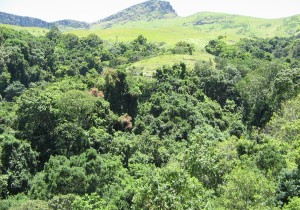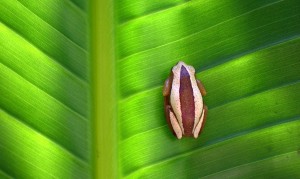CHAPTER < SEVEN - THE GREEN LUNGS OF THE EARTH CONTD...
 Every year about 160 000 square kilometres of rainforest are being felled, with an area the size of France having been chopped down from Brazilian rainforests over the past 30 years. And it is estimated that only 10 per cent of rainforests globally will still be standing after the first decades of the 21st Century.
Every year about 160 000 square kilometres of rainforest are being felled, with an area the size of France having been chopped down from Brazilian rainforests over the past 30 years. And it is estimated that only 10 per cent of rainforests globally will still be standing after the first decades of the 21st Century.
Stripping the Earth of its forests could well contribute to future global ecocide to an extent we cannot now imagine; for just as a human body cannot survive without its lungs, the planet may also not be able to survive without its forests – its great green lungs. For the indigenous people who make their home in the forests, the problems of deforestation are both more personal and more immediate than for the rest of the world’s population, which largely has only an abstract concept of their stake in these unique and valuable ecosystems. As their forest home diminishes day by day, the forest dwellers are rapidly losing a way of life that has sustained their cultures for countless generations.
In countries like Brazil, the self-sufficiency of the many forest peoples has been replaced with government policies and strictures, which have led in many forest tribes to apathy, degeneration, disempowerment and a loss of traditions and cultural references. People who once went about their business along the forest paths freely and vigorously, now sit apathetically in makeshift huts waiting for government handouts, having lost the will of initiative and the lifestyle that made it possible. For the millions of species of animals, birds, insects and plants that live in tropical forests, the process of deforestation is equally serious.
 The exact number of species that live in rainforest habitats is a subject of great debate, eliciting wide disagreement between biologists. There is also no consensus in scientific circles as to the exact percentage of species that live in tropical rainforests relative to the global number of species, although this percentage has been put at 50 per cent of all terrestrial species, which is very high in accordance with the latitudinal species-diversity gradient, which puts highest species diversity in the tropics. What biologists do universally agree upon, is the importance of tropical rainforest biodiversity both to the natural world and to humankind, and the depredation that a loss of such biodiversity would bring about should the majority of these species become extinct due to deforestation of their rainforest habitats.
The exact number of species that live in rainforest habitats is a subject of great debate, eliciting wide disagreement between biologists. There is also no consensus in scientific circles as to the exact percentage of species that live in tropical rainforests relative to the global number of species, although this percentage has been put at 50 per cent of all terrestrial species, which is very high in accordance with the latitudinal species-diversity gradient, which puts highest species diversity in the tropics. What biologists do universally agree upon, is the importance of tropical rainforest biodiversity both to the natural world and to humankind, and the depredation that a loss of such biodiversity would bring about should the majority of these species become extinct due to deforestation of their rainforest habitats.
Should deforestation continue at its present destructive rate, biologists believe that as many as 50 000 species of plants could disappear out of a world total of 250 000 species. One-fifth of the world’s total of butterfly species could disappear, whilst the number of bird species lost could be 2000 out of a world total of 9000 species. Like the lost dodo of Mauritius, which after being hunted into extinction disappeared forever into eternity, many of the most interesting and exquisitely plumaged birds would be eliminated from the planet’s lands and skies.
From an ethical viewpoint this is a catastrophe of enormous consequence for both the natural world and the human race combined for, as we have seen, each and every species represents the culmination of evolutionary links in a chain that stretches back thousands of millions of years. In order to have survived this far, species must have run a gauntlet of major extinctions and ice ages across landscapes that have challenged only the fittest to survive.
 To unravel this amazing tapestry of life, on such a huge and significant scale within such a short period of time, is to bring about a vast blight on our collective human conscience. From another perspective, if we take cognizance of the Buddhist belief that wrong deeds bring down negative karma on the perpetrators, such wholesale ecocide could be expected to result in terrible repercussions for all of humankind.
To unravel this amazing tapestry of life, on such a huge and significant scale within such a short period of time, is to bring about a vast blight on our collective human conscience. From another perspective, if we take cognizance of the Buddhist belief that wrong deeds bring down negative karma on the perpetrators, such wholesale ecocide could be expected to result in terrible repercussions for all of humankind.
However let us put these important moral and ethical considerations aside for the moment and consider other practicalities from the perspective of pure self-interest. For millennium upon millennium organisms have been the only means of sustaining human beings. They have provided food, medicine, clothing, shelter and energy down through the ages. Many of these needs have been derived from plants grown in forests, biologically some of the richest biomes on Earth.
In modern times for example, countless human headaches have been soothed with aspirin, the most widely used medicine in the world. Salicylic acid, a component of aspirin, was originally discovered in the bark and leaves of the willow tree. Muscle relaxants used during surgery have come from curare, an Amazonian vine. The rosy periwinkle found only in Madagascar has been found to be effective in treating certain forms of leukaemia, giving children treated with drugs derived from this plant a greater chance of survival. The contraceptive pill, which has been so significant in helping to curb human population figures and improve quality of life for millions of women and children around the world, was originally manufactured from a wild yam grown in forests in Mexico.
It is entirely possible that a cure for HIV/AIDS and certain cancers is growing in a quiet, green forest glade somewhere on the planet. But perhaps we shall never find it for yet again, instead of valuing the world’s natural forest resources for their unique contributions to our health and welfare, their importance as a habitat and last refuge to myriad forest creatures, as well as their vital significance in sustaining the chemical composition of the atmosphere; we have been chopping them up in a one-time orgy of consumption that will never be available again. And what we have not chopped up, we have burnt down.
From outer space it is possible to see the hundreds of fires that are burning away the Earth’s precious green mantle. What is left of the forest after the burning, we have carved up into pockets criss-crossed with roads and highways that slice through the integrity of the natural forest, marooning animal and plant populations into fragments of species-destroying isolation.
With the destruction of the forests, the Earth’s green lungs, we are bringing an incalculably terrible blight down on our own heads and the heads of our children and grandchildren. The late 19th Century American writer John Muir, one of the foremost conservationists of his time, wrote: “The wrongs done to trees, wrongs of every sort, are done in the darkness of ignorance and unbelief, for when light comes the heart of the people is always right”.
This quotation appeared in an article titled “Save the Redwoods” which was published in the Sierra Club Bulletin in January 1920. At that time in world history, with World War One having run its agonised course, people’s considerations were taken up with other more pressing problems. Saddened and exhausted by the carnage of the war to end all wars, people of the early 20th Century did not consider environmental concerns to be a top priority and, for most of them, the darkness of ignorance and unbelief probably did prevail – there was too much else to engage their attention. However at the start of this new century this is definitely not the case. We now understand full well the implications of global deforestation and still we allow this destructive practice to continue. Will we, as with so much else that is going on in the world at this time, only find the light and the right heart when it is too late?…